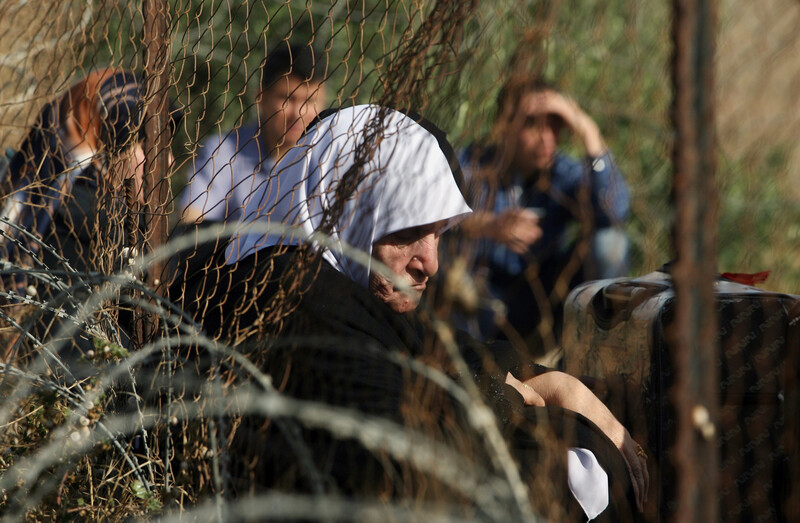The Electronic Intifada Gaza Strip 1 May 2014

Rafah crossing has been open approximately twelve days this year.
APA imagesNaser Abu Shammala had quit smoking a few years ago. But the stress of waiting to travel from Gaza led him to resume.
A Canadian citizen, Abu Shammala had been living outside his native Gaza for fifteen years. Two months ago, he returned to visit relatives.
When The Electronic Intifada met him, Abu Shammala was making his fifth attempt to pass through the Rafah crossing, which separates Gaza from Egypt. He was hoping to fly from Cairo to Canada, where he makes his living selling used cars. Accompanied by his wife and two daughters, he was puffing on a water pipe at a modest restaurant near the crossing.
“I have been waiting to go back to Canada for about six weeks now,” he said. “I am now stuck along with my family and I have lost lots of business. Every time I attempt to cross, I come here with my family but they turn us back, giving the excuse that the Egyptians are not allowing travelers like ourselves to cross.”
“Unbelievable”
Abu Shammala has contacted Canadian diplomats asking for their help but they refused to intervene. The gist of their response was “you have gone on your own and you should come back on your own, too,” he said.
His daughter Lama described the experience of waiting at Rafah as “humiliating.”
“You feel as if you are denied a very basic human right, which is the right to travel, of course,” she said. “It’s like hell here and I do not think I am going to come back to Gaza again. I have missed important exams at my nursing school. It’s unbelievable.”
Lama’s sister, Laila, teaches English at a school in Canada. She has been threatened with being fired if she does not return soon.
A few hundred people were gathered at the Rafah crossing at the same time as the Abu Shammala family. Some were lucky. Over the past week, the Egyptian authorities allowed a number of pilgrims to leave Gaza so that they could make their way to Mecca in Saudi Arabia.
Under pressure
The crossing has frequently been closed since Muhammad Morsi, Egypt’s elected president, was ousted in a July 2013 military coup. According to officials in Gaza, the Egyptian authorities tend to open it suddenly every fifty days.
Iyad Albozom, a spokesperson for the Hamas-led interior ministry in Gaza, said that the manner in which the crossing is opened after being closed for lengthy periods puts the authorities under huge pressure. Once the authorities opened a registration process for those willing to leave through Rafah recently, “we received 6,000 new travelers in a few hours,” Albozom said. “Can you imagine?”
The spokesperson added that the crossing had only been open for twelve days between January and last week.
He stated that the closure was having a serious effect on medical patients who require treatment that is not available in Gaza’s hospitals. Lately, cancer patients have often been referred to hospitals in the occupied West Bank and present-day Israel, rather than to Egypt.
In March, a three-year-old child died after he was unable to receive medical care outside Gaza. Ahmad Ammar Abu Nahl suffered from an enlarged heart and liver. His family had been hoping to bring him to Turkey — via Egypt — for treatment (“Three-year-old dies due to closure of Rafah crossing,” Maan News Agency, 13 March 2014).
Statistics from the World Health Organization show that 220 applications for permits to access healthcare outside Gaza were delayed in March of this year alone; an average of 135 permits were delayed per month in 2013 while the rate was much lower — an average of 17 delayed permits per month — in 2012 (“Humanitarian bulletin monthly report,” United Nations Office for the Coordination of Humanitarian Affairs occupied Palestinian territory, March 2014).
Since 2006, Egypt has helped Israel impose a siege on Gaza, with devastating health consequences. The problems have worsened since last year’s coup. Egypt’s military authorities have shut down tunnels, through which medicines and fuel were brought into Gaza.
According to the World Health Organization, only 36 medical patients were able to travel from Gaza to Egypt in February.
Rami Almeghari is a journalist and university lecturer based in the Gaza Strip.





